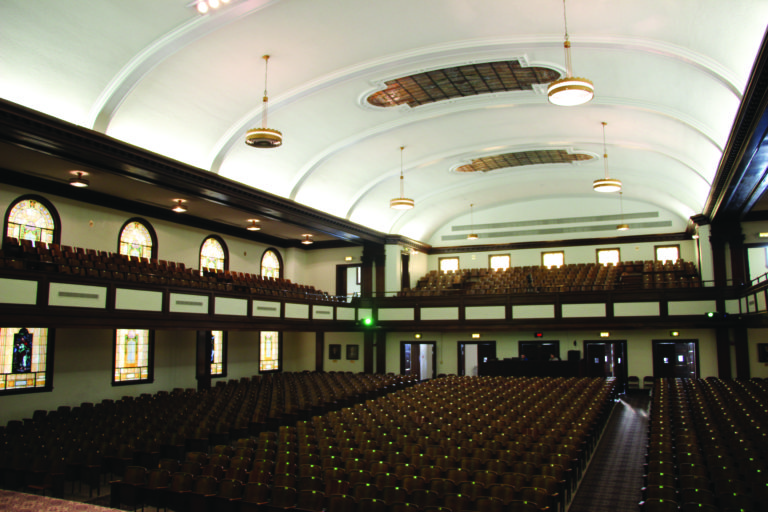By Courtney Cox, Contributing Writer
Every Monday, Wednesday and Friday morning, Asbury students file into Hughes Auditorium for chapel: 50 minutes filled with worship and a message by a speaker who may or may not have a familiar face. Campus Chaplain Greg Haseloff is responsible for scheduling and facilitating Asbury’s chapel speakers but said the process of selecting speakers is very much a “community effort.” It may be easy to forget to acknowledge the behind-the-scenes work that goes into chapel, but be assured that Asbury’s chapel speakers are carefully selected with the intention of promoting diversity, community and, of course, spiritual vitality.
While all current students, faculty and staff play a collective role in selecting speakers best fit for the campus, specific leaders play collaborative roles in the logistical selection of chapel speakers. Haseloff first reports to President Sandra Gray and Vice President of Student Development Sarah Baldwin who both play critical collaborative roles in the planning process. The Cornerstone Council, a group of faculty and student leaders who steward a commitment to spiritual vitality, also play a role in the selection of chapel speakers.
Chapel speakers are typically booked two to four months before the beginning of each semester, though some may be booked as far as 18 months in advance. Chapel speakers who are not directly affiliated with the university are given an honorarium for their time. Speakers who require overnight housing are most often put up in Windsor Manor, Asbury’s recently opened guest house on the east side of Jewell Rd., about .25 miles from the Luce Center.
Haseloff noted that chapel is a “central pulpit for our campus,” and because of this, he and those involved in selecting chapel speakers strive for diverse voices and teachings. He said that the team has had important conversations regarding ethnic diversity among chapel speakers. And while he acknowledges that he and the team have not gotten the chapel selections “right” every semester, he said that improvements have been made.
While Asbury’s theological heritage does play an important role in the selection of chapel speakers, the selections are not limited to those who practice their faith within the Wesleyan-holiness family of denominations. Along with ethnic and theological representation, students are also exposed to political diversity in chapel services. Haseloff said that there is no aim for specific political representation. “We would hope for a variety of political representation since we understand that no single political affiliation has a corner on biblical truth,” Haseloff said.
As far as qualifications go, the university does not have a set outline of requirements for chapel speakers. “A life grounded in the truth of Scripture and a heart overflowing with the grace of God is essential,” Haseloff said. “We seek to understand our students and the need to have speakers who are authentic, bearing fruit where Christ has called them. The cornerstones of our spiritual vitality are Scripture, holiness, stewardship and mission, which means we search for speakers who can articulate these core realities to the student body. To find speakers who align themselves with Asbury’s mission and calling means that we begin by looking for women and men who are sensitive to God’s presence and how His spirit is at work on our campus, in this generation, and across the globe.”
Photo by Rebecca Hurshman




